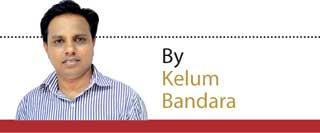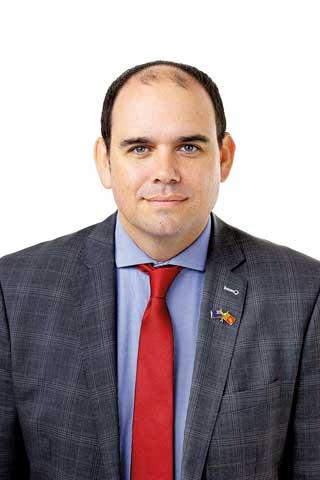Source:Dailymirror
Economically we want to build a larger, more diverse trading relationship for the benefit of both sides
We believe in an open, free and inclusive region
The scrutiny applied to individuals seeking to enter New Zealand is based on the risk they pose, not where they come from
New Zealand’s Sri Lankan community, which numbers around 17,000, is a dynamic, treasured and peaceful part of New Zealand society
We are committed to doing everything we can to ensure the safety and security of everyone who calls New Zealand home
 New Zealand opened a resident mission in Sri Lanka recently to promotion of bilateral ties to a new level. Its High Commissioner Michael Appleton in an email interview with the Dailymirror responded to queries about the new areas of bilateral cooperation, recent knife rampage in his country by a person of Sri Lankan origin, security cooperation and geopolitics.
New Zealand opened a resident mission in Sri Lanka recently to promotion of bilateral ties to a new level. Its High Commissioner Michael Appleton in an email interview with the Dailymirror responded to queries about the new areas of bilateral cooperation, recent knife rampage in his country by a person of Sri Lankan origin, security cooperation and geopolitics.
Excerpts of the interview-
Q New Zealand has now opened its resident mission in Sri Lanka. Actually, what prompted you to open a mission in the country instead of looking after Sri Lanka from your mission in New Delhi as was the case?
New Zealand has been working towards opening its High Commission in Colombo for a few years now and we are proud to be making this investment in the relationship between our two countries. We are pleased to be here in Colombo and we are committed to building the relationship. There are a number of factors which prompted the opening of the Post – political, economic, strategic and cultural – but they boil down to the fact that there’s way too much happening between New Zealand and Sri Lanka, and in the wider region, for us not to be physically present in Colombo.
Q In what way do you intend to elevate bilateral relations?
We will be working closely with Sri Lankan authorities to achieve a number of shared objectives. Politically we want to ensure our leaders and our officials are more regularly engaged in dialogue on policy issues of mutual interest. Economically we want to build a larger, more diverse trading relationship for the benefit of both sides. Strategically, we want to ensure we are sharing perspectives and experiences as fellow island nations in the Indo-Pacific region. And culturally, we want to harness the expertise and passions of our respective diaspora communities, while also building on links that exist such as our shared love of cricket and rugby.
Q How does New Zealand view Sri Lanka’s positioning in the region from geo-economic and geo-political perspectives?
Sri Lanka’s positioning is for its political leaders and the voters who elect them. What I would say is that New Zealand and Sri Lanka are both relatively small, island democracies in a region – the Indo-Pacific – that have their fair share of very large players. Whether you’re talking about China, India, the United States, the European Union or Japan, all of the world’s largest actors are part of the region that both Sri Lanka and New Zealand call home. It is thus obvious that any geostrategic positioning that may exist will have some impact on our countries and we will have to adapt. That is something that Sri Lanka and New Zealand have in common.
For New Zealand’s part, we will respond to questions of geo-strategy with a firm eye on our values. We believe in an open, free and inclusive region. We believe in democracy and human rights, and in an international system based on a clear set of rules. We believe in the preservation of sovereignty and mutual respect. And we believe in countries making commitments to one another, including through the multilateral system sand sticking to them. COVID-19 has put a strain on every country in the world, but we cannot allow it to damage the spirit of international cooperation that has been an engine of human progress over the past 70 years or so.
Q Recently you met with Secretary to the President Dr. P.B. Jayasundara and discussed economic cooperation. What steps have been taken to foster trade relations as a follow-up?
I was pleased to meet the Secretary to the President, to share with him my plans and hear about the President’s policy agenda. I think it is fair to say that both governments are very keen on expanding and diversifying the trading relationship, so that our consumers and businesses can benefit. For a long time, New Zealand dairy products and Sri Lankan tea have had pride of place at the centre of the trading relationship. We need to build on that.
Q Sri Lanka imports milk powder mainly from New Zealand. Sri Lanka is probably one of the largest milk powder importers in the world. Today there is a shortage of powdered milk in the local market. Besides, Sri Lanka is keen on improving the local dairy industry. How can the two countries cooperate on this field?
New Zealand has been supplying milk powder to Sri Lanka for decades and as a result we know how important it is to the livelihoods and nutrition of so many Sri Lankan families. At the same time we understand and support the desire of the Sri Lankan authorities and people to develop this country’s dairy industry.
That is why in 2013 New Zealand signed a Dairy Cooperation Arrangement with the Government of Sri Lanka. Ever since then we have been implementing projects that have contributed to improving the scale and productivity of the Sri Lankan dairy industry. Those projects, benefiting from New Zealand expertise, have focused on a wide range of areas, from veterinary science to farmer training and rural livelihoods.
Q An Islamic State inspired assailant from Sri Lanka went on a knife rampage in New Zealand. Later the media reported that a man who may have unknowingly helped funnel money to terrorists behind the Easter bombings in Sri Lanka has been granted refugee status in New Zealand. In the backdrop of these incidents will there be more screening of Sri Lankan nationals migrating to New Zealand in the future?
As you expect, national security is of paramount importance to us, and this includes careful and thorough management of the security of our borders by relevant authorities. But the scrutiny applied to individuals seeking to enter New Zealand is based on the risk they pose, not where they come from.
New Zealand’s Sri Lankan community, which numbers around 17,000, is a dynamic, treasured and peaceful part of New Zealand society. Criminals exist in all societies and they should not tarnish the reputation of a country or of people with whom they share a nationality, ethnicity or religion.
Q In the wake of these incidents what kind of security cooperation is going on between the two countries to curb extremism?
We are in discussions with Sri Lankan authorities to develop this aspect of our bilateral relationship, including to ensure that our security agencies are working as closely together as possible. We want to ensure that we can both benefit from cooperation in the security domain.
Q The security authorities of New Zealand could not net this knife attacker. Previously, there was a more serious attack on a mosque. Is it due to weakness of your security establishment or extremists taking advantage of the liberal atmosphere in your country?
New Zealand has suffered from two shocking acts of terrorism in the last few years. We are working to learn from those cases so that our national security system can be strengthened, and so we can live in a diverse, inclusive society where everyone can feel safe, secure and valued. In the case of the mosques attack we held a Royal Commission of Inquiry whose recommendations are in the process of being implemented. That includes strengthening our gun laws, supporting the recovery of affected families, survivors and witnesses and tackling harmful behaviour and discrimination.
But it would be wrong to extrapolate these two incidents, by self-radicalised individuals from very different backgrounds, into broader negative commentary about New Zealand. We are, in the main, a very peaceful country – in which incidences of terrorism and violent extremism are mercifully rare by international standards. Our national security system is effective and internationally connected. These two events have been shocking to New Zealanders precisely because they are so rare and as a nation we are committed to doing everything we can to ensure the safety and security of everyone who calls New Zealand home.
Q New Zealand has been adjudged the best in the world in curbing Covid-19. What insights can you share with Sri Lanka in this regard?
It is true that New Zealand has had, in global terms, very low levels of deaths due to COVID-19 at the same time as greater freedoms from COVID-19 restrictions for most of the first 18 months of the pandemic. But we have had our challenges too and we are currently tackling a Delta outbreak in our largest city, Auckland.
Delta is proving a tricky adversary. This is why achieving a high rate of vaccination coverage is so important: it’s the only way that societies can sustainably loosen COVID restrictions, whilst not suffering unacceptably large numbers of deaths from the virus.
Some cornerstones of New Zealand’s approach to date have been a border that is mostly closed to non-New Zealanders, compulsory quarantine for those entering the country, robust testing and tracing capacity, and lockdowns as soon as cases in the community appear. The other piece of the puzzle is mass vaccination.
In August, New Zealand announced its next steps in reconnecting to the world in the period ahead. A new framework for travel has been announced, which will involve gradually shifting our border settings to a risk-based approach based on individual travellers, taking into account a number of factors, including where they are travelling from and their vaccine status.
Q In your view can New Zealand’s Covid-19 prevention model be applied in Sri Lankan context?
It’s not for me to say how another country should approach COVID-19. New Zealand wishes Sri Lanka every success in the measures it’s taking to combat the virus. What I would say is that all governments have a shared interest in ensuring that humanity is vaccinated as quickly, widely and equitably as possible. This is why New Zealand has demonstrated its strong support for the global COVAX Facility through a contribution of more than US$12 million and the donation of 2.3 million doses of vaccines. COVID-19 doesn’t respect borders, and we are only going to manage it effectively by working together.






